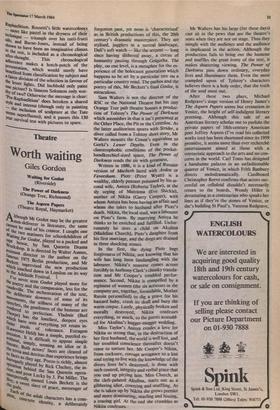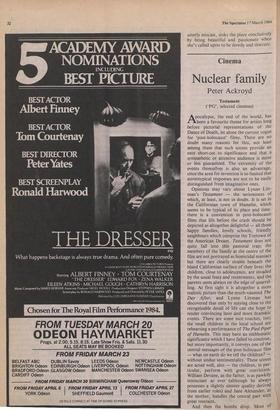Theatre
Worth waiting
Giles Gordon
Waiting for Godot (Riverside)
lin Power of Darkness ((Orange Tree, Richmond)
The Aspern Papers
(Theatre Royal, Haymarket) Although Mr Godot may be the greatest non-deliverer in literature, the same cannot be said of his creator. I caught one ,1 the two matinees for schoolchildren of -cliting for Godot, played to a packed and rapt house by San. Quentin Drama Workshop. It is directed by Walter Asmus, sistant director to the author on the ,„`aalous 1975 Berlin production, and Mr
neckett supervised ouch th new
`which touched ed down ine on
Ldonproduction on its way
to the Adelaide Festival.
l've
tile Poet never seen Godot played
ry and the , l the more for
atideville. The orchestrationcompa_ssion ofe t ss hefor text, :Ilthe deliberate slowness of some of its uiternents, the stillness of many of the ,..Peeches, the gentleness of the humour are `elictered to perfection_ Vladmir (Bud ‘,,91.13e) has the loneliest, deepest eyes ‘ch have seen everything yet retain in- (i White Pools of tolerance. Estragon r:e`-`us'rence Held) has a simple, P1'771ed ssion. It is difficult to appear simple literate simply, seeming an idiot or il- 'Crate- Both actors' faces are cleared of tote rivia and detritus that experience brings 6a races a they age. Pozzo is richly, almost
NuelY Played by Rick Cluchey, the in-
on behind the San Quentin opera- tunri' and Poor Lucky by J. Pat Miller. The ii0Pectedly named Louis Beckett is the ' gods sweet slave of grace, messenger of Each
'
let. of the adult characters has a corn- , concrete identity, a deliberately forgotten past, yet none is 'characterised' as in British productions of this, the 20th century':s dramatic masterpiece. They are stylised, jugglers in a surreal landscape, Dali's soft watch — like the serpent — long since having slithered away, a circus of humanity passing through Golgotha. The play, on one level, is a metaphor for the ex- perience of the holocaust generation which happens to be set by a particular tree on a particular country road. ['he pathos and the poetry of this_ Mr Beckett's final. Godot, is miraculous_ Sam Walters is not the director of the RSC or the National Theatre but his tiny Orange Tree pub theatre houses a produc- tion of Tolstoy's The Power of Darkness which astonishes in that it isn't presented at the Other Place, the Pit or the Cottesloe. As the latter auditorium sports with Strider, a sliver culled from a Tolstoy short story, Mr Walters mounts the Count's equivalent to Gorki's Lower Depth.s. Even in the claustrophobic conditions of the pocket- handkerchief-sized space, The Power of Darkness rends the air with greatness.
Written in 1886, it is a kind of Russian version of Macbeth laced with Arden or Faversham. Piotr (Peter Wyatt) is a wealthy, elderly peasant poisoned by his se- cond wife, Anisya (Roberta Taylor), at the sly urging of Matriona (Eve Shickle), mother of Nikita (Garry Cooper), with whom Anisya has been having an aftair and whom she takes to husband after Piotr's death. Nikita, the local stud, was a labourer on Piotr's farm. By marrying Anisya he thinks to be enriched and fulfilled. Unfor- tunately he sires a child on Akulina (Madeline Church), Piotr's daughter from his first marriage, and the dregs are drained in three shocking scenes.
In the first, the dying Piotr begs forgiveness of Nikita, not knowing that his wife has long been fandangling with the labourer_ Nikita's remorse comes across forcibly in Anthony Clark's chunky transla- tion and Mr Cooper's troubled perfor- mance. Second, Nikita is compelled by a regiment of women (the six actresses in the company are, together, formidable, Mother Russia personified) to dig a grave for his bastard baby, crush its skull and bury the warm corpse. Lastly, physically broken and morally destroyed, Nikita confesses everything, or much, to the guests assembl- ed for Akulina's hugger-mugger wedding.
Miss Taylor's Anisya exudes a love for Nikita so strong that, in the destruction of her first husband, the world is well lost, and her troubled conscience thereafter doesn't cease to torture her. Mr Cooper's Nikita, from cocksure, corrupt arrogance to a lost soul trying to live with the knowledge of the divers lives he's destroyed, is done with such control, integrity and verbal grace that you end up pitying him. Miss Church, as the cleft-palated Akulina, starts out as a gibbering idiot, cowering and snuffling. As she is taken up by Nikita she grows prettier and more dominating, snarling and hissing, a roaring girl. At the end she crumbles as Nikita confesses. Mr Walters has his large (for these days) cast sit in the pews that are the theatre's seats when they are not on stage. Thus they mingle with the audience and the audience is implicated in the action. Although the production fails to bring out the humour and muffles the great irony of the text, it makes shattering viewing_ The Power of Darkness pins down ordinary, everyday lives and illuminates them. Even the most trampled upon of Tolstoy's characters believes there is a holy order, that the truth of the soul must out.
After these two plays, Michael Redgrave's stage version of Henry James's The Aspern Papers seems but cremation in Venice, the height of self-indulgent literary preening. Although this talc of an American literary scholar out to purloin the private papers of 18th-century American poet Jeffrey Aspern (I've read his collected works too) has been shortened since its 1959 premiere, it seems more than ever recherche entertainment aimed at those with a voyeuristic approach to the arts and no con- cerns in the world. Carl Toms has designed a handsome palazzo in an unfashionable quarter of Venice, in which Frith Banbury directs melodramatically. Cardboard Christopher Reeve confirms that actors suc- cessful on celluloid shouldn't necessarily return to the boards. Wendy Hiller is devastating as a centenarian who speaks her lines as if they're the stones of Venice, or she's building St Paul's. Vanessa Redgrave,
utterly miscast, sinks the piece conclusively by being beautiful and passionate when she's called upon to be dowdy and insecure.















































 Previous page
Previous page